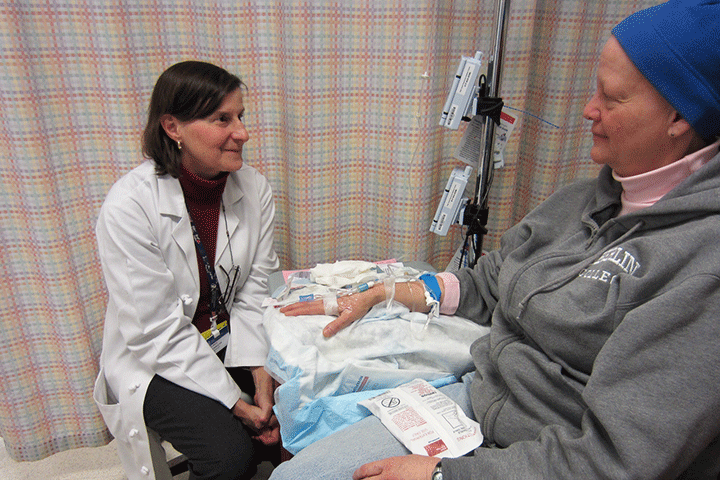Handling the Changes Cancer Brings to Your Lifestyle

Dr. Sunil Hingorani; Dr. David Zhen
Treatment for pancreatic cancer means creating a new normal, especially for your quality of life.
What will you be able to continue to do? What major changes will you face? And how will all this impact your relationships with spouses, children, and friends? There is no playbook for pancreatic cancer. Instead, you need to focus on how cancer touches each aspect of your life—and what you can do to stay at the top of your game with each new challenge.
Cancer Treatment’s Downstream Effects
Career.
For some patients, their work is their life. It’s where they find joy and where they derive meaning. So how do you handle work obligations? “It’s all dictated by the desires and drives of the patient, what they enjoy and what they have energy for,” says Sunil R. Hingorani, M.D., Ph.D., member of the Fred Hutchinson Cancer Research Center’s Clinical Research and Public Health Sciences divisions and Founding Director of the Pancreas Cancer Specialty Clinic at Seattle Cancer Care Alliance, Seattle, Washington. So, if your career is important to you, your doctors will help you create a schedule that works with your energy level.
What to do: You may want to continue working full-time, or you may want to dial down to a part-time or work-from-home schedule. The key is to find a schedule that’s doable and pace yourself. And remember, if you need time off, take it.
Energy.
Unfortunately, cancer and treatments for the disease are known to sap your energy. Some days will be better than others. While reduced energy should be expected, there’s a clear line between fatigue and depression. If you’re feeling down for days at a time, talk to your doctor. Depression is treatable.
What to do: “Be as functional as possible,” urges David Zhen, M.D., medical oncologist at the Seattle Cancer Care Alliance and an Assistant Professor of Medicine at the University of Washington, Seattle. “Even if you’re struggling to get out of the chair, get out of the chair for a good chunk of the day.” It seems counterintuitive, but expending energy begets energy.
Relationships.
Pancreatic cancer often comes with role shifts, changes, and reversals in relationships. Some relationships may feel supportive while others lead to frustration. “Many people want to offer support, but don’t know how,” explains Zhen. “Other times, loved ones try to overcompensate and the patient feels smothered.”
What to do: Keep the lines of communication open. Be honest with loved ones and family members about what you can and cannot do. Perhaps most important, be vocal about what you need.
Appetite.
Your appetite is likely to dwindle while you’re navigating cancer and you’ll probably lose weight, too. “Most patients lose more muscle mass than fat,” says Zhen. “That’s why we encourage patients to eat protein-rich foods.” To compensate, you may have to shift from eating a few big meals daily to eating several small snacks throughout the day.
What to do: Eat what you like—even if it’s “unhealthy.” Want cheesecake three times a day? Have at it. The only foods you might consider moving off the table are lower-calorie foods. Only have the stomach for a small amount of food? Eat a tablespoon of peanut butter or a few cubes of cheese instead of a couple of stalks of celery.
Exercise.
A growing body of research suggests doctors should prescribe exercise to pancreatic cancer patients. In fact, conditioning your body prior to undergoing surgery or cancer treatment could boost your odds of survival. You might not be able to do heavy contact sports, or box with a champion heavyweight, but you can still keep your body moving.
What to do: “Some experts recommend at least 150 minutes each week, but I tell patients ‘do as much as you can,’” says Zhen. Take a walk around the block, hit the golf course, or go for a swim. You might also consider ways you can modify your exercise regimen to match your energy levels. Maybe you shadow box instead of facing an opponent or play doubles tennis instead of singles. Get creative and you’ll find ways to stay active.
Sex.
Most people aren’t enjoying a good sex life while they’re navigating cancer treatment, and for good reason. It can be difficult to feel desirable when you don’t feel like yourself. Surgical scars, hair loss, fatigue, and other treatment side effects can derail even the most active libido. And while cancer certainly isn’t sexy, it’s often a catalyst for deeper intimacy.
What to do: Cancer may redefine your sex life, but there are plenty of ways to be intimate, even without intercourse. Sometimes just touching one another, cuddling, or holding hands kindles desire. Many institutions have an oncofertility clinic. While they focus on preserving reproductive function for younger patients, they also provide support to all patients in terms of sexual wellbeing.
What You Wish To Do
At the start of any treatment regimen, the most important question to ask yourself is this: “What’s important to me?” “What do you do during the day or week that’s important to you—that brings you joy?” says Hingorani. “What do you want to do during the next six months or one year?” Once you get a handle on that, you can work with your health care team to devise a plan that gets you there.





